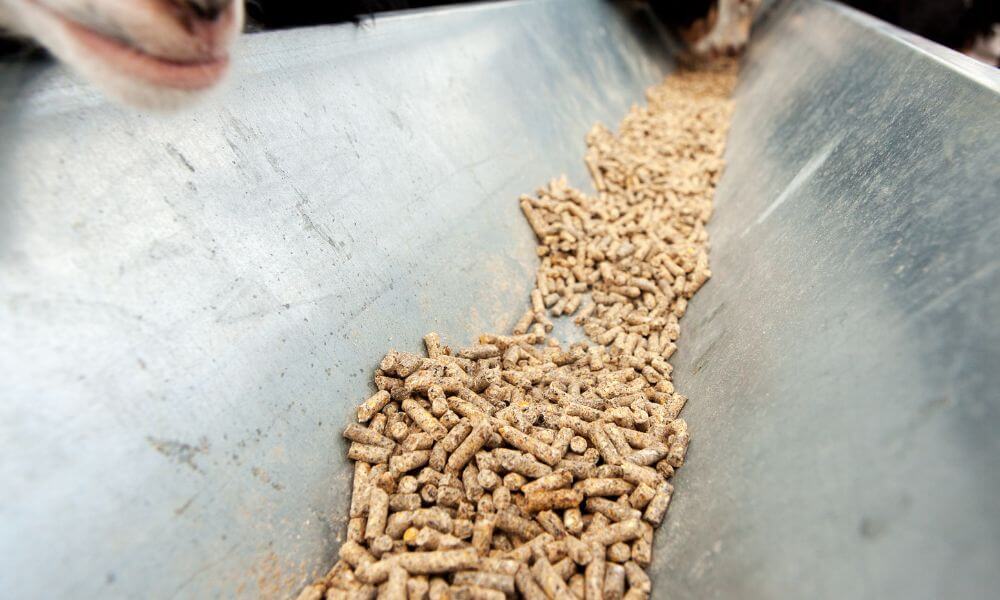Often, one of the first signs of illness we notice in animals is that they stop eating.
This is naturally always a cause for concern and pet owners get understandably worried.
When it comes to legendary eaters like goats, the cause for concern can be even greater.
If you’ve noticed that your goat has stopped eating or has a reduced appetite, there are many reasons why this might be the case.
Whatever the reason, it’s vital that you move quickly to put it right and figure out what is wrong with the goat.
A goat not eating could indicate it is seriously unwell—at the same time, it could just be having a bit of a sulk.
Either way, it’s your job to identify the problem so you can begin to put it right as quickly as possible.
Let’s look at a few reasons your goat might not be eating.

Illness
One of the most common reasons a goat stops eating, and indeed one of the most worrying depending on the circumstances, is illness.
Naturally, this is a very broad term and covers a lot of varied conditions.
Many, many illnesses could lead to your goat not eating properly.
Scours in young goats can often put them off their food for a while, as can coddidiosis, enterotoxemia, or many bacterial infections like E. coli or salmonella.
An illness could mean that your goat cannot face any food, or that it cannot properly digest it. either of these factors will cause the goat to stop eating, potentially.
Many of these conditions are going to be difficult to diagnose without professional help. If you have no experience with any of these conditions, you should speak to a vet as soon as you can.
They can diagnose the exact issue you’re dealing with, and design the appropriate treatment.
If you don’t address these illnesses early, they could well be fatal.
In heat
One of the other common reasons for reduction in goat appetite is that they are in heat.
This might depend on what exactly you’re feeding them.
Often, this is an issue specifically with grain.
Does who are in heat often will be less interested in eating grain.
They may also lose their appetite entirely, though.
Generally, this issue should only last a few days.
It’s easy to tell when a doe is in heat. She will behave very differently, presenting herself to any bucks, raising her tail up, among other things.
If you think the goat is in heat, give it a little time to get eating normally again.
This shouldn’t last very long as I say, though you should still keep a very close eye on it.
| Related Articles |
|---|
Parasites
Many internal parasites affect goats, and any one of these could have an impact on the goat’s appetite.
One of the most common in the U.S. is the barber pole worm.
These are blood drinkers, and will attach themselves inside your goat.
They will also often move around, making them hard to remove.
In this case and the case of many other, similar parasites, the goat will lose its appetite and even become anemic.
There’s not much to be done for this without getting a vet involved.
You can check the goat’s eyelid, to see the color of the membrane—this can often warn you of an infection.
A vet will be abele to administer the proper treatment.
| Related Posts |
|---|
Gas
One of the big problems that goats face just in their everyday life is gas.
Their diets need to be really quite simple—consisting of mostly hay.
This is because their digestive systems are really quite simple, equipped to break down only quite simple foods.
When they eat something more complex, or too much of it, at least, then they may become gassy.
When gas is trapped in their rumen, they have enormous trouble eating properly.
Any number of typical foods can cause gas and bloating, and can in turn lead to a lack of appetite.
Feel the goat’s rumen to see if it is hard to the touch and bloated.
Again, this should relax over a short time. Get a vet involved if it doesn’t seem to be improving.
Dying
Finally, it’s not a possibility any of us want to consider.
But you do have to take it into account.
How old is your goat?
Has it shown signs of slowing down, and old age?
One of the first things that can happen when a goat is approaching the end of its life is a lack of appetite.
It will stop eating either because it can’t any longer or it simply has no appetite anymore.
Again, it’s always worth speaking to a vet even If you are certain this is what’s happening.
At the very least, they can help you make the goat’s passing easier.
There are many reasons why a goat might stop eating.
All of them should give you concern, and you should take it very seriously.
The best advice to give in these circumstances is always to consult a vet.
Even if you are a veteran goat owner, there’s still a strong chance you might not be able to properly diagnose the issue, which could make it worse.
Ultimately, your goat could be very sick, or it could be totally fine.
You should always treat these cases with the utmost care, though, and act as if you expect the worst.
This gives you the best chance of properly treating whatever is causing the problem.
Again, though, your best thing to do is call the vet as soon as you can.

So my goat is old but he eats everything except for pellets and is skin and bones. Doesn’t have worms, grazes and eats treats just not regular food